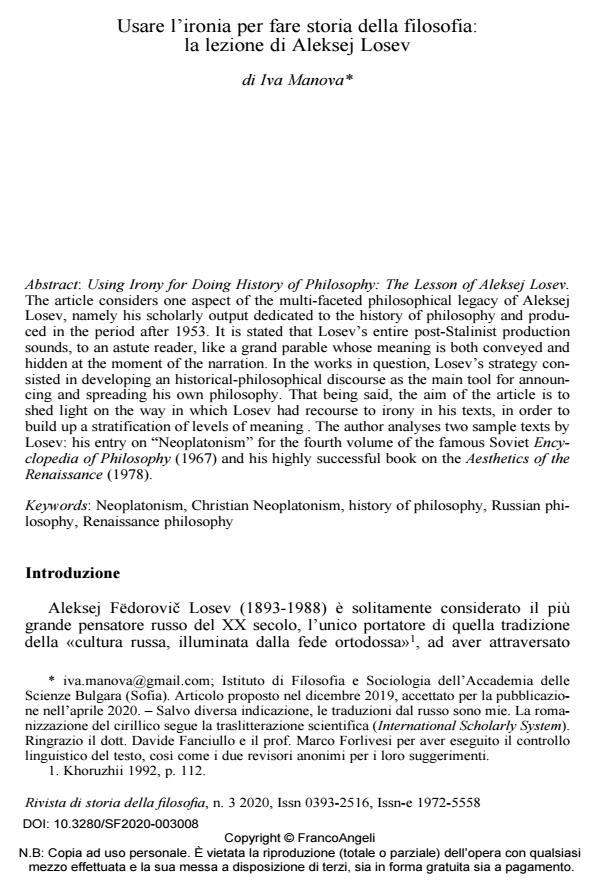Usare l’ironia per fare storia della filosofia: la lezione di Aleksej Losev
Titolo Rivista RIVISTA DI STORIA DELLA FILOSOFIA
Autori/Curatori Iva Manova
Anno di pubblicazione 2020 Fascicolo 2020/3
Lingua Italiano Numero pagine 16 P. 529-544 Dimensione file 120 KB
DOI 10.3280/SF2020-003008
Il DOI è il codice a barre della proprietà intellettuale: per saperne di più
clicca qui
Qui sotto puoi vedere in anteprima la prima pagina di questo articolo.
Se questo articolo ti interessa, lo puoi acquistare (e scaricare in formato pdf) seguendo le facili indicazioni per acquistare il download credit. Acquista Download Credits per scaricare questo Articolo in formato PDF

FrancoAngeli è membro della Publishers International Linking Association, Inc (PILA), associazione indipendente e non profit per facilitare (attraverso i servizi tecnologici implementati da CrossRef.org) l’accesso degli studiosi ai contenuti digitali nelle pubblicazioni professionali e scientifiche.
The article considers one aspect of the multi-faceted philosophical legacy of Aleksej Losev, namely his scholarly output dedicated to the history of philosophy and produced in the period after 1953. It is stated that Losev’s entire post-Stalinist production sounds, to an astute reader, like a grand parable whose meaning is both conveyed and hidden at the moment of the narration. In the works in question, Losev’s strategy consisted in developing an historical-philosophical discourse as the main tool for announcing and spreading his own philosophy. That being said, the aim of the article is to shed light on the way in which Losev had recourse to irony in his texts, in order to build up a stratification of levels of meaning . The author analyses two sample texts by Losev: his entry on "Neoplatonism" for the fourth volume of the famous Soviet Encyclopedia of Philosophy (1967) and his highly successful book on the Aesthetics of the Renaissance (1978).
Parole chiave:Neoplatonism, Christian Neoplatonism, history of philosophy, Russian philosophy, Renaissance philosophy
- «Una fisionomia predatoria»: la Gioconda e il "mito sovietico" nella lettura di Aleksej Losev Olga Igorevna Kusenko, in RIVISTA DI STORIA DELLA FILOSOFIA 1/2022 pp.157
DOI: 10.3280/SF2022-001009 - A way out of hell: Dante and the philosophy of personal salvation in post-Soviet Russia Olga Igorevna Kusenko, in Studies in East European Thought /2023 pp.709
DOI: 10.1007/s11212-022-09519-5
Iva Manova, Usare l’ironia per fare storia della filosofia: la lezione di Aleksej Losev in "RIVISTA DI STORIA DELLA FILOSOFIA" 3/2020, pp 529-544, DOI: 10.3280/SF2020-003008